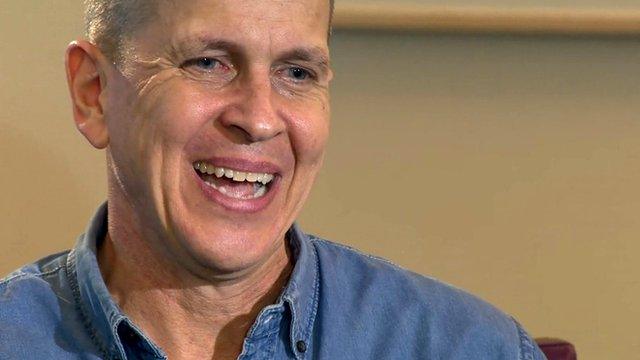Egypt al-Jazeera verdict 'wrong on so many levels'
- Published
Peter Greste: "To be sentenced to three years is just devastating"
Australian reporter Peter Greste is now coming to terms with life as a convicted terrorist after being jailed by a court in Cairo.
The highly regarded al-Jazeera correspondent, who was retried in absentia, watched the verdict unfold on Twitter at his lawyer's city centre office in his hometown of Sydney.
As he waited patiently for the judges' ruling to filter through online, Greste was again supported by his long-suffering family who'd linked up for this monumental decision via Skype from other parts of Australia.
There was a hush as his fate was revealed.
"It took a moment to sink in," the 49-year-old told the BBC in Sydney shortly after the verdict was handed down. "It was disbelief, I guess. To be sentenced to three years in prison is just devastating. It is outrageous. It is so wrong on so many levels."
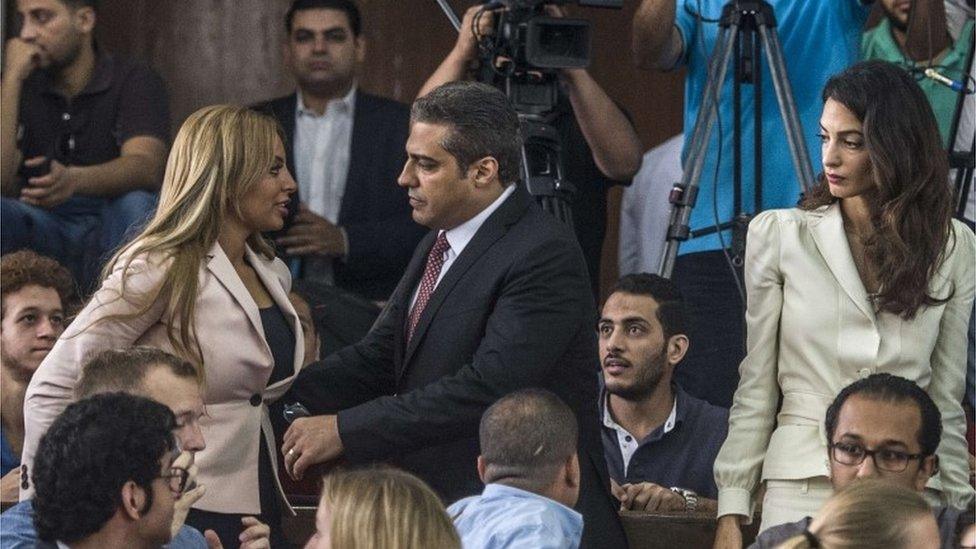
Canadian al-Jazeera journalist Mohamed Fahmy with his wife Marwa, while his lawyer Amal Clooney looks on
Within minutes of receiving the shattering news from a courtroom half a world away in North Africa, Greste spoke to Australian Foreign Minister Julie Bishop, who promised to use the government's diplomatic muscle to have the conviction overturned.
"We have always said we will do everything it takes to clear our names because it is not just the prison sentence, it is not just the convictions, it is the principle that matters here," Greste added. "We will pursue every legal, diplomatic and public measure that we can to make sure we get this right."
'Furious'
The Australian's legal avenues appear limited. Unlike his co-defendants, Mohamed Fahmy and Baher Mohamed, Peter Greste can't appeal against the judges' decision. To do so, he'd have to return to Egypt, which deported him earlier this year.
"It makes me sick to my stomach to know that innocent men are going to endure that kind of suffering (in prison). It makes me furious to see this," Greste said of the treatment meted out to his al-Jazeera colleagues.
The three journalists were detained in December 2013, charged with "spreading false news" and collaborating with the Muslim Brotherhood, which is now outlawed as a terrorist group by Egyptian authorities.
Peter Greste's lawyer has told BBC News that he will ask for a presidential pardon.
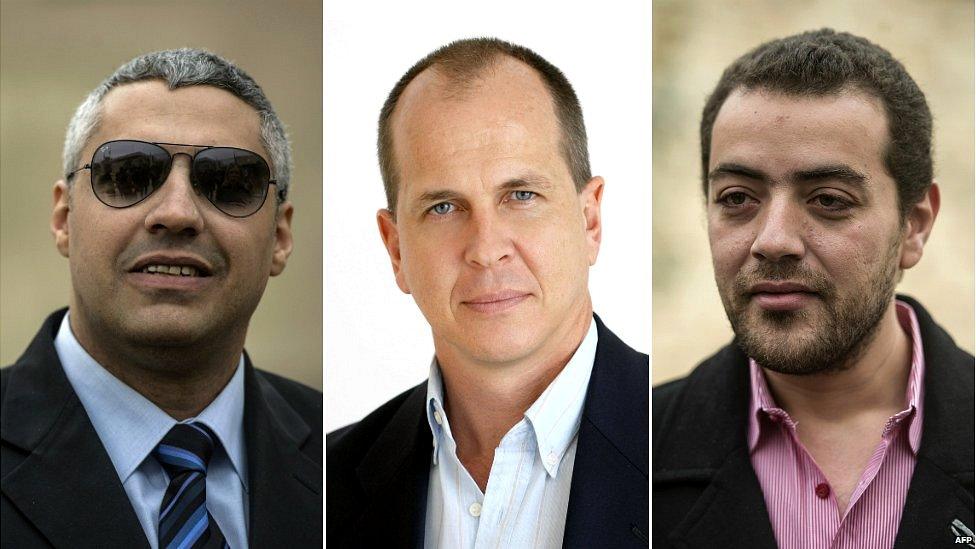
Mohamed Fahmy (left), Peter Greste and Baher Mohamed were freed before their retrial
"There was an opportunity that has been lost today for Egypt to correct a string of injustices." said Chris Flynn, a specialist in international law at Gilbert and Tobin in Sydney.
"It is a complete travesty of justice. The eyes of the world are on Egypt and we will fight on to make sure Peter is exonerated."
Even for a seasoned professional with experience in Bosnia, Afghanistan and Somalia, Greste is uncomfortable in the spotlight. He is a calm and measured man, who would clearly prefer to be reporting the news than making it.
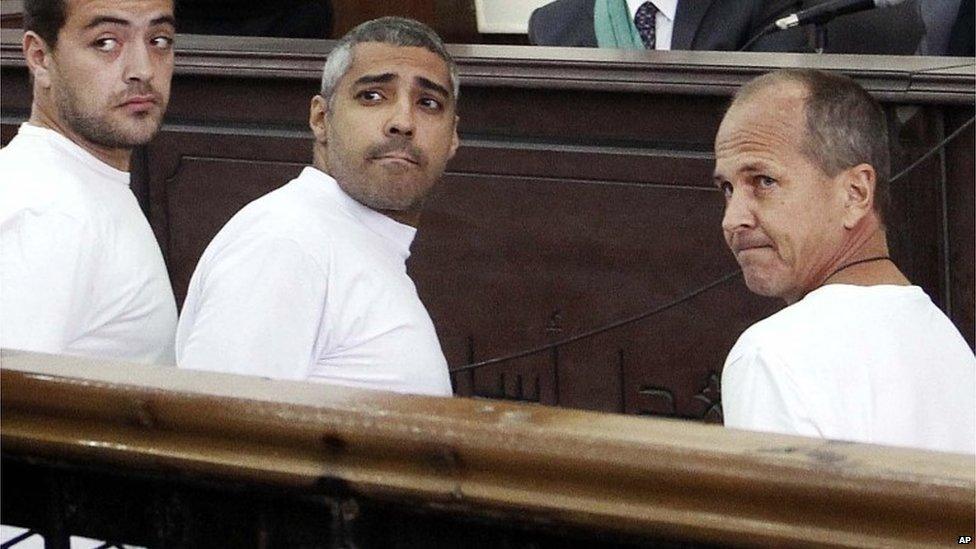
Peter Greste (R) was deported in February by Egypt after 400 days in prison
His conviction means he would be unwise to visit countries with extradition treaties with Egypt. Despite his jail sentence, Greste is a free man, but he remains burdened by a grievous sense of injustice.
"It is a limited type of freedom. I can move around Australia but my ability to travel internationally is severely curtailed and that, as a foreign correspondent, is really quite devastating," he explained.
Before the verdict, Greste had spoken in recent days of his hopes to return to a normal life by taking up a six-week position as a journalist-in-residence in Perth, Western Australia before moving back to Africa to write a book in Kenya.
Those plans may be put on hold as he fights to clear his name and win the release of his two co-workers. He remains employed by al-Jazeera but has indicated he may work part-time to pursue other projects.
The court's decision, he told the BBC News website, "radically changes my life, but that is a mere inconvenience compared to what it means for Fahmy and Baher."
- Published13 February 2015
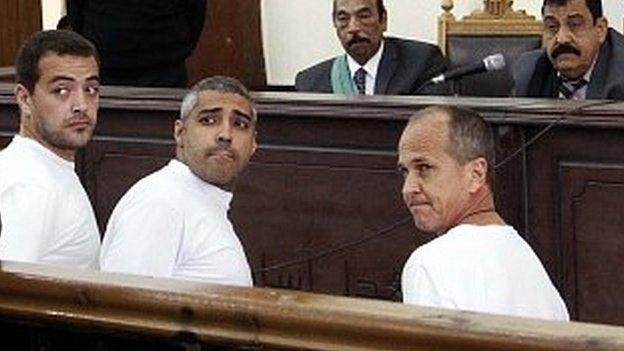
- Published23 June 2014
- Published5 February 2015
